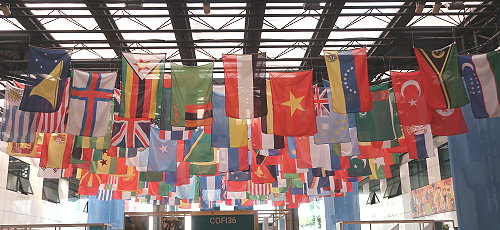 Upon invitation of the organising committee at the FAO, Cornelia E Nauen of Mundus maris attended the second SSF Summit taking place in the premises of FAO from 5 to 7 July 2024. The first day was exclusively reserved for members of the International Planning Committee for Food Sovereignty (IPC) Working Group on Fisheries with a thematic focus on customary tenure rights for small-scale and indigenous fisheries. During the weekend, with some 300 participants admitted, the emphasis shifted towards sharing recent experiences and regional group discussions focused on translating these experiences into next steps of implementation to be carried for the ensuing meeting of the Committee of Fisheries (COFI38).
Upon invitation of the organising committee at the FAO, Cornelia E Nauen of Mundus maris attended the second SSF Summit taking place in the premises of FAO from 5 to 7 July 2024. The first day was exclusively reserved for members of the International Planning Committee for Food Sovereignty (IPC) Working Group on Fisheries with a thematic focus on customary tenure rights for small-scale and indigenous fisheries. During the weekend, with some 300 participants admitted, the emphasis shifted towards sharing recent experiences and regional group discussions focused on translating these experiences into next steps of implementation to be carried for the ensuing meeting of the Committee of Fisheries (COFI38).
In the run-up to the summit, Mundus maris had continued its efforts for the dissemination of the SSF Guidelines by producing a version of the explanatory video and of the gender equity and equality video with Pidgin English sound tracks to support better information, particularly in Nigeria and neighbouring countries. The videos are available on the Mundus maris YouTube channel. Haussa versions will follow shortly. We would have liked to sponsor also the attendance of Awa Djigal, Executive Secretary of the Network of Women in Artisanal Fisheries in Senegal (REFEPAS), but unfortunately that was not possible because of space limitations and the care the organising committee had taken to ensure gender and geographical balance. The concept note and programme outline is available here.
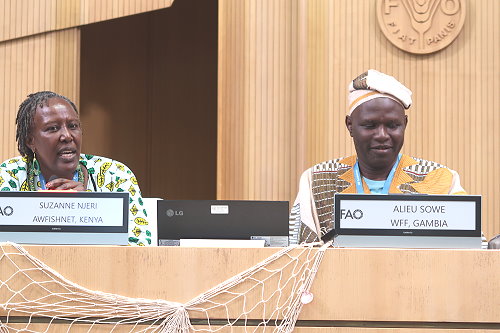 Besides the official programme, as usual, the networking with old and new colleagues and friends was crucial in tuning into opportunities for advancing the support for sustainable small-scale fisheries against a trend of shrinking their role and influence. Indeed, one notes a curious contrast between the encouraging aspirational statements which have remained stable over the last 20 or so years and the ground realities created by structural government laws and measures as well as facts created by influential investors.
Besides the official programme, as usual, the networking with old and new colleagues and friends was crucial in tuning into opportunities for advancing the support for sustainable small-scale fisheries against a trend of shrinking their role and influence. Indeed, one notes a curious contrast between the encouraging aspirational statements which have remained stable over the last 20 or so years and the ground realities created by structural government laws and measures as well as facts created by influential investors.
Meanwhile the role of coastal seafood collection for subsistence has shrunk and small-scale commercial fisheries take the brunt of overfishing by often subsidised industrial fisheries. These small-scale users depend more directly on healthy and productive resources for their livelihoods.
The decision by the General Assembly of the UN to declare 2022 the International Year of Artisanal Fisheries and Aquaculture (IYAFA) and the many dedicated initiatives by fisher organisations and research teams, such as the report titled 'Illuminated Hidden Harvest', and the book series produced by the global research platform 'Too Big To Ignore' (TBTI), thankfully contributed to raising the profile of artisanal fisheries.
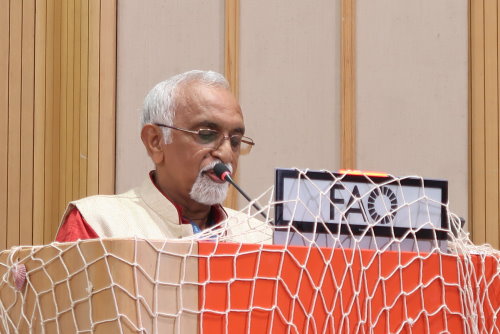 This year's celebration of the 10th anniversary of the Voluntary Guidelines for Ensuring Sustainable Small-Scale Fisheries in the context of food security and poverty alleviation (SSF Guidelines) was an excellent opportunity to reflect on the achievements of these ten years of struggle to advance their implementation. With the thoughtful memory lane presented by John Kurien, the institutional memory of more than half a century of struggles, the participants were taken even further back to the early days of organising small-scale fishers and the enormous efforts and sacrifices made by the movements and their leaders to advance the cause of recognising artisanal fishers as legitimate rights holders with a voice in decision making and stewards of healthy aquatic environments.
This year's celebration of the 10th anniversary of the Voluntary Guidelines for Ensuring Sustainable Small-Scale Fisheries in the context of food security and poverty alleviation (SSF Guidelines) was an excellent opportunity to reflect on the achievements of these ten years of struggle to advance their implementation. With the thoughtful memory lane presented by John Kurien, the institutional memory of more than half a century of struggles, the participants were taken even further back to the early days of organising small-scale fishers and the enormous efforts and sacrifices made by the movements and their leaders to advance the cause of recognising artisanal fishers as legitimate rights holders with a voice in decision making and stewards of healthy aquatic environments.
He commemorated in particular Chandrika Sharma, the tireless fighter for the rights of small-scale fishers, men and women, who was on board flight MH370 en route to an FAO conference in Mongolia when the flight disappeared March 7, 2014.
Several regional sessions allowed for more in-depth exchanges, always guided by the concern to stimulate more action and collaboration around the challenge to ensure voices of small-scale fishers are heard. This is crucial as awareness rises of the essential roles of the ocean in climate stabilisation, biodiversity protection and as a huge resource which needs to be better understood. The ocean must not be ravaged by short-term exploitation by a few powerful interest groups without regard to anything and anybody.
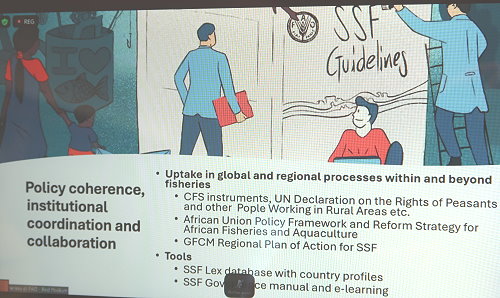 The FAO Officers working with the General Fisheries Commission for the Mediterranean (GFCM) kicked off these regional sessions with a summary of activities since the last SSF Summit. The Regional Plan of Action for Small-Scale Fisheries in the Mediterranean and the Black Sea (RPOA-SSF) comprises nine pillars corresponding to the chapters of the SSF Guidelines. At its mid-term it needed to focus on priority activities remaining to accomplish its objectives by 2028. The indicators helping to monitor progress showed that the engagement of stakeholder organisations was slow to materialise as were advances in social protection and access to such social services. Data collection about SSF had certainly improved and measures to improve gender equity were underway, but overall implementation of the plan was lagging.
The FAO Officers working with the General Fisheries Commission for the Mediterranean (GFCM) kicked off these regional sessions with a summary of activities since the last SSF Summit. The Regional Plan of Action for Small-Scale Fisheries in the Mediterranean and the Black Sea (RPOA-SSF) comprises nine pillars corresponding to the chapters of the SSF Guidelines. At its mid-term it needed to focus on priority activities remaining to accomplish its objectives by 2028. The indicators helping to monitor progress showed that the engagement of stakeholder organisations was slow to materialise as were advances in social protection and access to such social services. Data collection about SSF had certainly improved and measures to improve gender equity were underway, but overall implementation of the plan was lagging.
A key lesson so far was that strong political backing was a determining condition for advances thanks to governments and professional organisations taking ownership. The GFCM kept providing technical backstopping and pushing for implementation. The Plan of Action provided a framework to play out many synergies between countries and sectors and was attentive to maintain, if not expand, the space for SSF.
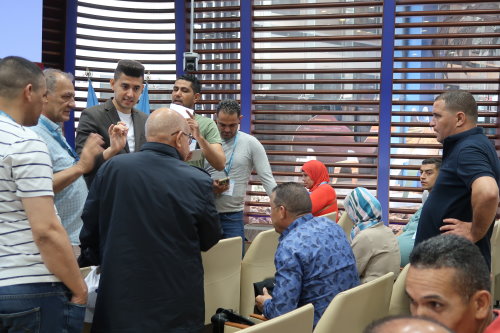 |
 |
| One Arab-speaking break-out Med group | The Italian-speaking break-out Med group |
 |
 |
| Africa group meeting | One of the Francophone Africa break-out groups reporting |
In the Africa sessions, participants broke up into several linguistic groups each working on what would be important forthcoming events where to make the voices of SSF heard while mostly focusing on priority steps to be taken: social rights and access to services like education, health and safe water supplies, recognition of women's role in the sector, curbing destructive industrial fisheries, in particular turning good food fish into fish meal. COFI was requested to put SSF again on the agenda and make sure that the frenzy about the blue economy was not turned against conferring tenure rights to SSF. Their representatives need to participate in sector governance, in some cases, coast guards may perhaps even seek collaboration with SSF for the surveillance of coastal waters against IUU fishing. A good example of participatory governance in Sri Lanka and improved access to services in parts of the Philippines were mentioned as inspiration, while the battle against poverty and even hunger needs continued attention.
Marine tenure rights were identified as a priority for artisanal fishers and their organisations in all regions.
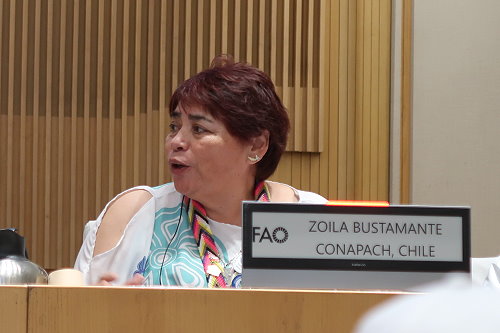 |
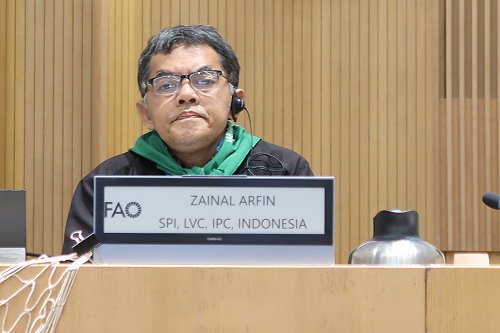 |
| Zoila Bustamante of CONAPACH, Chile, a tireless fighter for SSF | Zainal Arfin of SPI, LVC & IPC, Indonesia reported on IPC |
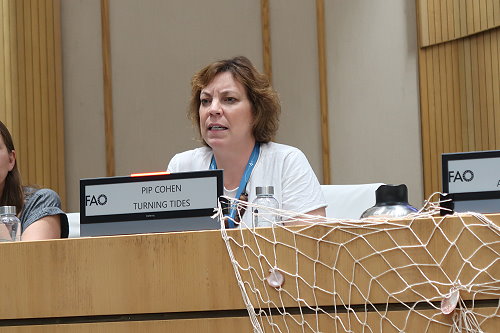 Before concluding the first day with a dinner on the FAO terrace overlooking Circo Massimo and the ruins of the empirial palaces, Imani Fairweather Morrison, Oak Foundation, shared views from the persective of a funding organisation committed to support SSF. Pip Cohen of Turning Tides added her analysis. She pointed out that out of approximately USD 1.2 billion spent by ocean philanthropy in 2020 only about USD 100 million or 8.3% went to support SSF and coastal communities. The lion's share was handled by six big international NGOs. She had found similar conditions in relation to climate change. At best 1% of the funding was handled directly by SSF and indigenous peoples. She pointed to the inequities in that system and was exploring ways on how to change money flows directly to SSF and indigenous peoples' organisations. She advocated a new culture to support local government and organisations and announced that with support from the Oak Foundation Turning Tides would open an international giving facility focused initially on tenure security starting grant allocation later this year.
Before concluding the first day with a dinner on the FAO terrace overlooking Circo Massimo and the ruins of the empirial palaces, Imani Fairweather Morrison, Oak Foundation, shared views from the persective of a funding organisation committed to support SSF. Pip Cohen of Turning Tides added her analysis. She pointed out that out of approximately USD 1.2 billion spent by ocean philanthropy in 2020 only about USD 100 million or 8.3% went to support SSF and coastal communities. The lion's share was handled by six big international NGOs. She had found similar conditions in relation to climate change. At best 1% of the funding was handled directly by SSF and indigenous peoples. She pointed to the inequities in that system and was exploring ways on how to change money flows directly to SSF and indigenous peoples' organisations. She advocated a new culture to support local government and organisations and announced that with support from the Oak Foundation Turning Tides would open an international giving facility focused initially on tenure security starting grant allocation later this year.
A WWF initiative to map all activities in support of local organisations and to create a central hub to share information in the network was received with some scepticism as it was unclear whether communities had given prior informed consent and whether detailed public information might not put e.g. some indigenous people in harm's way. It was also unclear whether the requested information would cover how much money the NGOs working with SSF had received and how much of that was disbursed and how. From the reactions it became clear that in a number of cases, NGOs had sought information in communities, but often did not feed back the results of their analyses in view of developing follow-up action together. So, the need for greater accountability and trust building became apparent.
An impressive line-up of speakers reported on national and regional challenges and advances in implementing key elements of the SSF Guidelines. Two government officials took the floor to underline their government's commitment towards securing a sustainable future for SSF in their remit. One was the Minister of Livestock and Fisheries of Tanzania, Abdallah Ulega. He underlined that 98% of all fisheries and fishing in the country was small-scale, so it was only natural that he was engaged with a national Plan of Action in support of implementing the SSF Guidelines, including a specific loan facility for means of production, including for rural aquaculture. He also highlighted that the African Union was supporting an African SSF Summit every two years.
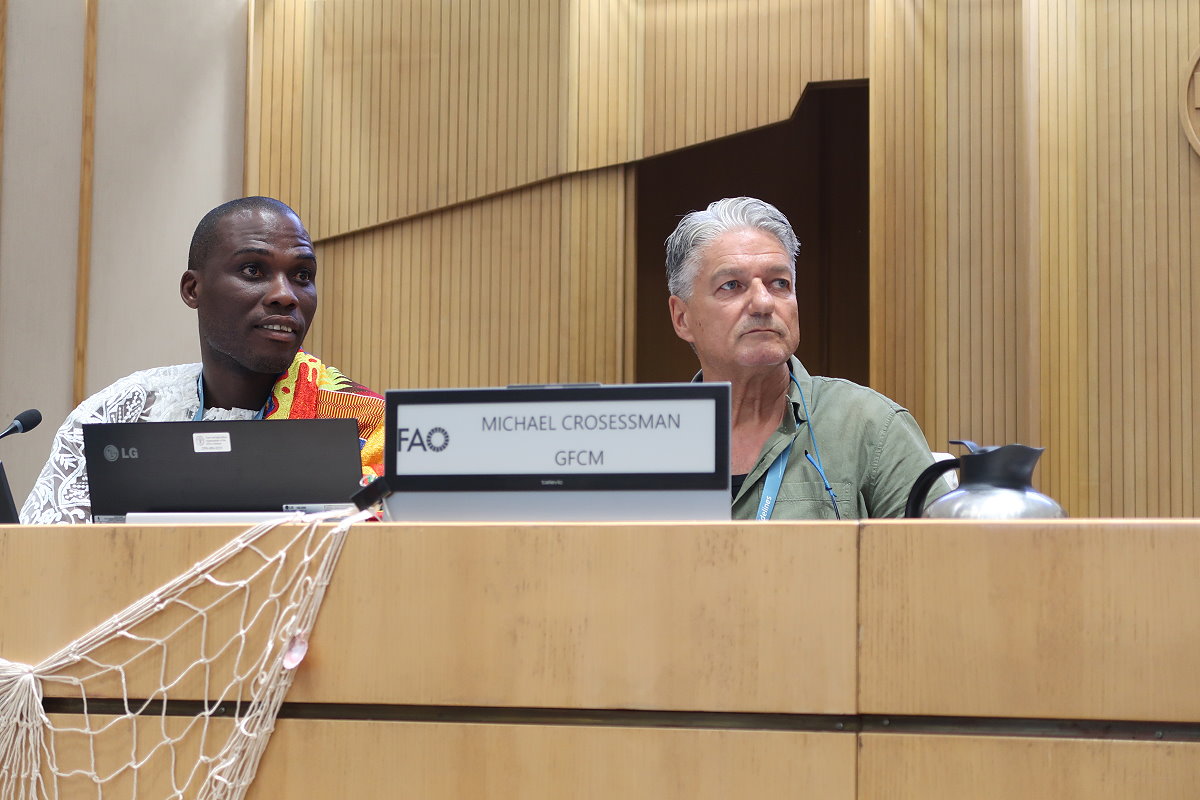 The other one was Drusila E. Bayate, Undersecretary for Fisheries in the Department of Agriculture of the Philippines. She emphasised the need for participatory governance and involvement of SSF in local and regional management bodies. She also cautioned that the multisectoral approaches needed were a challenge for all public institutions and professional organisations. Strong participatory approaches and competent scientific support were required for success.
The other one was Drusila E. Bayate, Undersecretary for Fisheries in the Department of Agriculture of the Philippines. She emphasised the need for participatory governance and involvement of SSF in local and regional management bodies. She also cautioned that the multisectoral approaches needed were a challenge for all public institutions and professional organisations. Strong participatory approaches and competent scientific support were required for success.
Representatives from the Pacific Island States reminded everybody of the fact that their land territorie were only a minute fraction of their Exclusive Economic Zones and the diversity of local management arrangements. They were under considerable threat from climate change and other negative impacts produced by others.
During the Closing Session, ably chaired by Nana Kweighyah of the Ghana Boat and Fishing Gear Owners Association, speakers from the different regions summarised action points: Herman Jumara, of the IPC regional advisory group Asia highlighted tenure rights among the major issues. He underscored how important it was to seek alliances beyond fisheries as well as keeping a keen eye for intersectional agendas, such as gender equity and social development. He advocated to keep the messenging simple to enable building broad-based consensus for collective action.
 Marta Machazek of ULAPA, Panama, speaking for the Latin American region, regreted that the international debate about biodiversity protection, namely the 30x30 decision enshrined in two recently agreed treaties, namely the Global Biodiversity Framework and the BBNJ treaty to protect the High Seas, was little known in different SSF communities. As a result, she expressed concern about their (non)participation during the ratification and implementation processes. Better information about the SSF Guidelines remained also a continuous task as people in many remote communities were still not aware of their rights. She expressed gratitude towards local NGOs for their support, but suggested that often times financial resources to enable more systematic participation of SSF communities were insufficient.
Marta Machazek of ULAPA, Panama, speaking for the Latin American region, regreted that the international debate about biodiversity protection, namely the 30x30 decision enshrined in two recently agreed treaties, namely the Global Biodiversity Framework and the BBNJ treaty to protect the High Seas, was little known in different SSF communities. As a result, she expressed concern about their (non)participation during the ratification and implementation processes. Better information about the SSF Guidelines remained also a continuous task as people in many remote communities were still not aware of their rights. She expressed gratitude towards local NGOs for their support, but suggested that often times financial resources to enable more systematic participation of SSF communities were insufficient.
 Margaret Nakato of Katosi WDT, Uganda, acknowledged that African SSF were looking forward to the forthcoming international meetings to speak up, but also recommended that COFI should put SSF topics again on its agenda. She said the different organisations would be monitoring advances in mainstreaming SSF on the respective agendas. She recommended setting up national chapters where strong professional organisations did not yet exist to strengthen capacities and pushing for implementation of the Guidelines in each country.
Margaret Nakato of Katosi WDT, Uganda, acknowledged that African SSF were looking forward to the forthcoming international meetings to speak up, but also recommended that COFI should put SSF topics again on its agenda. She said the different organisations would be monitoring advances in mainstreaming SSF on the respective agendas. She recommended setting up national chapters where strong professional organisations did not yet exist to strengthen capacities and pushing for implementation of the Guidelines in each country.
Michalis Croessmann of the Amorgos Association of Professional Fishers, Greece, summarised the hopes throughout the Mediterranean as wanting to be more ambitious in implementing the GFCM SSF Action Plan through 2028. The migration of invasive species through the Suez Canal was jeopardising the livelihoods of many coastal fishers even if markets existed or could be development for some, like the blue crab. Gender equity was a long neglected issue which required a lot more effort. He also pointed to the lacunes in social protection which were particularly large in some countries, but should be stepped up throughout the region.

Sonia Sharan of Oceana confirmed the wish to overcome any mistrust towards environmental NGOs by stepping up collaboration and capacity to bring resources to the legitimate causes of SSF.
As for scientific research, Ratana Chuenpagdee, leader of the global network 'Too Big To Ignore', focused on documenting and supporting the causes of SSF, assured the audience that research was carried out for and not against SSF.
Nicole Franz of the SSF Hub at FAO drew the exchanges to an end reflecting on the fact that representatives of small-scale fishers had met in Rome to claim their rights four decades earlier. Now, some 300 people from small-scale fisheries and indigenous peoples with a range of staunch supporters met within FAO. She concluded that the meetings had been useful, that key messages were going to be brought to the attention of COFI and that, as an immediate follow-up, a meeting report would be produced for wide dissemination. She invited all participants to share this experience wherever they went.

Mundus maris will continue to support capacity strengthening of SSF through the SSF Academy with any group interested in collaboration that advances the operatonalisation of the Guidelines bringing together rights-based approaches for resilient and productive SSF and nature restauration and protection.
Mundus maris also endorses des demand of several civil society organisation to the FAO Committee of Fisheries (COFI), taking place in the week immediately after the SSF Summit, to stop calling the aquaculture of carnivorous fish species sustainable. This is because its rapid expansion is jeopardising the fishery of wild resources. A major concern is the requirement for feeds with rather high animal protein content. That requires reduction of huge quantities of what could be good food fish for people with low incomes into fish meal and oil for the fattening of carnivorous species. Intensive marine aquaculture in cages often creates dead zones around the cages from excess feeds and high burden of fish exrements in the environment. Large numbers of salmon escapes are also known to pollute the gene pool of wild populations. A similar demand to stop supporting intensive aquaculture, mostly of carnivorous species, has been addressed to Hungary which holds the current EU presidency. See the open letter here. For sustainable practices, aquaculture should focus on species low in the food web, which fisheries for wild species can harvest the species high in the food web most in demand, while taking care not to fish both predators and their prey very intensely. Just as on land, it's husbandry of cows, sheep and goats, not lions for meat production.









